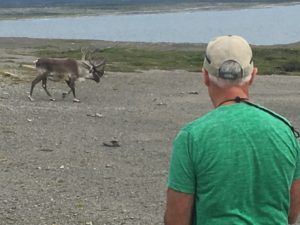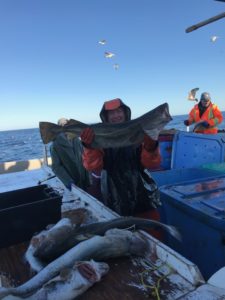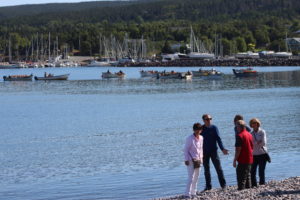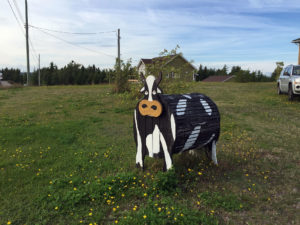As we often explain to guests on our McCarthy’s Party Tours, much of Newfoundland’s cultural mosaic can often be attributed to the simplest of factors; including a shortage of fresh meat.
To truly appreciate this phenomenon, one must realize that Newfoundland was once located at the southern most extension of the ‘Canadian Shield’. During the last ice age this island was covered in a dense blanket of ice that measured nearly a mile and a half in thickness.
Imagine? An 8000’ glacier covered the entirety of this place for over a million years – crushing, grinding, and scraping nearly every living feature from its face. All the soil, trees, plants, bushes, and flowers – every type of freshwater fish, the skunks and snakes, deer, racoons, gophers, whistlers, and porcupines. Everything was wiped clear, and remained as such since an isolated island would severely limit the repatriation of its terrestrial creatures.

“… severe shortage of fresh meat…”
But, where Canada’s glacial deposits make up the fertile grounds that flank the United States’ border, our earthly riches created a unique subsea environment atop a massive continental shelf. Officially known as the ‘Grand Banks’, it hosts a super jungle of plants and a diversity of living species exceeding anything found in the world’s rain forests.
Bolstered by the intense energy and subsequent nutrient upwellings caused by the divergence of two of the world’s most extremely polarized ocean tides (the Gulf Stream and Labrador Current), codfish thrive here, congregating in biblical proportions to form the largest protein biomass on the planet – Bringing much credence to the concept of “loaves & fishes”, and our capacity to feed the world for the past 500 years.

“… loaves and fishes…”
An area so rich that we were able, (and perhaps obligated), to share this resource with the European community, providing them with a coastal fishing zone still known as the ‘French Shore’. A length of ocean front property that extended all the way westward from Cape St John, circling north around the Great Northern Peninsula, before turning south again and stretching all the way to the island’s south western most point at Cape Ray.
Granted in the 1783 Treaty of Versailles, France controlled this territory for almost 150 years, rendering much of the central and western part of our island as a “No Man’s Land”, unexplored and nearly completely uninhabited since England’s terms disallowed the French from developing any property. Though Newfoundlanders could access the countryside, we were not permitted to fish. With no other sources of protein or financial opportunity, the area was deemed uninhabitable.

“… especially smart crowd…”
Thankfully we attract an especially smart crowd of tourists and it is usually at this point that one of our guests will ask about the moose. Providing us with an opportunity to nail two “memory” birds with the same stone. Starting with a quote from R.F. Sparkes, (one of our favorite Newfoundland authors);
“Recalling the date of one event by associating with something more memorable, was a most prevalent habit of our people. Nobody in Newfoundland seemed to bother much about the actual calendar if the subject under discussion could be placed in time with another, more significant occurrence. Accordingly, a man who built a schooner in 1915, would tell you she was finished in the second year of the ‘Great War’. By learning in this way, he was sure to remember it for the rest of his life.”
Thus, we like to tell guests; “The moose is not an indigenous creature. It was introduced to replace the French.”

“… garners great laughs…”
While this garners great laughs – in many ways it represents an especially memorable truth.
Once France relinquished their Newfoundland holdings in 1904 (trading it for what became ‘French Morocco’), the moose was brought to the island in the very same year – hoping to provide a source of fresh meat and “game hunting” opportunities for new settlers and tourists.
Suppose you could say, (hopefully in a French accent);
“Meese provided the feast that helped developed the east!


Nice job Andy, just read it out loud so Dad and I could enjoy. Read it all too!
French accent? Got you covered! 😉
French accent? I got you covered! 😉
French language is more like it. “I don’t know Mark, but the last time I saw her she was gone native!” Ahhhhh…. St. Pierre. Such a memorable adventure. Hello to all that joined